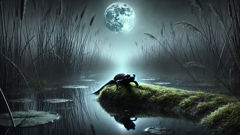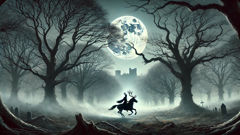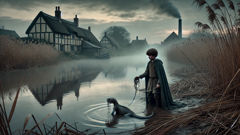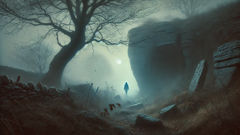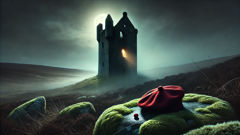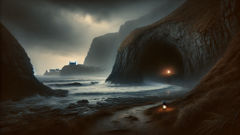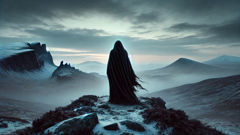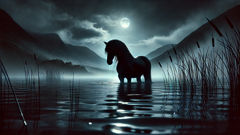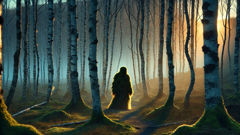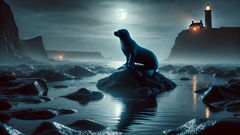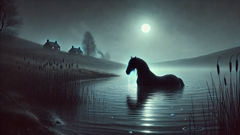Introduction
Ireland’s stories are woven from the mists that roll across its bogs, the murmur of rivers winding through emerald hills, and the hush that descends as dusk stretches its violet arms over the land. Here, where ancient trees lean close to whisper secrets into the wind, tales are born that linger for generations. Among them, one name persists with a chill—a creature seldom seen yet deeply feared: the Alp-luachra. In a time before written records, when belief in the Otherworld shaped every shadow and echo, villagers spoke of the Alp-luachra in hushed tones around the hearth. They warned their children never to drink from streams while lying down, lest something small and cold slip unnoticed between their lips. It wasn’t just a story to keep the reckless in line. The Alp-luachra, they said, was a fairy-being—a sly spirit that took the form of a newt, lurking in the still waters of bogs and riverbanks. It would wait, patient and cunning, for the thirsty or weary. Should it find an open mouth, it would slip inside, settle in the belly, and feed from within, stealing nourishment until its host wasted away.
Few dared to speak of encounters with the Alp-luachra, and fewer still could claim to have survived its curse. Yet, in County Mayo’s wild heart, the legend was more than a warning—it was a living presence, woven into the daily life and survival of those who worked the land. The story that follows is one such account, handed down through families, embroidered with details as vivid as the mossy stones of Knocknarea. It is the tale of a fisherman’s son, his family, and their struggle against a hunger that could not be sated—a story of cleverness, courage, and the strange bargains struck between humans and the wild magic of Ireland.
Listen close, for in the soft rush of water and the croak of frogs at dusk, you might still hear echoes of the Alp-luachra’s tale, and learn why some fears are carried not just in the mind, but in the very marrow of the land.
I. Hunger in the Heartland
Moss clung to every stone along the river Deel, and wild rushes swayed with each sigh of wind that swept across County Mayo. At the edge of the village of Drumcliff, where the woods pressed tight around the cottages and the bogs stretched out like a damp, breathing sea, lived the family of Seamus O’Shea—a fisherman, a father, and a man whose fortunes ebbed and flowed with the river’s moods.
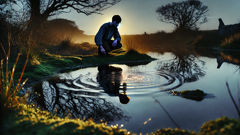
Seamus’s eldest son, Padraig, was a lad of fifteen, lean as a willow sapling and as patient as the river itself. He spent his days tending nets, mending the thatch, and listening to tales spun by his grandmother, Niamh, who claimed to know every spirit and trickster that haunted the land. To Padraig, the world was vast and full of hidden wonders, but hunger was a more pressing companion than magic.
The O’Sheas lived simply. Meals were drawn from the river and the earth: trout caught by Seamus at dawn, potatoes pulled from the black soil, wild herbs gathered by Padraig’s younger sister, Maire. Yet, as summer bled into autumn, the family’s larder grew thinner, and a strange malaise settled over the house. Seamus, once robust and quick with a joke, grew gaunt and silent. His hands trembled at mealtimes, and though he ate with the family, he wasted away as if each mouthful vanished into smoke.
Niamh watched him with narrowed eyes, her face lined like a map of old grief. One evening, as rain lashed against the shuttered windows, she whispered to Padraig: “There’s a hunger on your father that no bread will fill. Mark my words, child—there’s fairy-work about.”
Padraig listened, troubled. He remembered his grandmother’s warnings: never drink from a river unless you cup your hands, never lie on your belly by the stream, never trust a still pool in the bog. The Alp-luachra, she’d said, waited for the unwary. But such things seemed far away, the stuff of stories—until now.
Weeks passed. Seamus grew weaker. By the time Padraig found him shivering on the riverbank, clutching his belly and moaning with a pain no healer could soothe, the truth began to gnaw at him. That night, as Maire slept and Niamh tended the peat fire, Padraig slipped outside. He traced his father’s steps to a place where the river bent sharply, pooling into a mossy hollow. The grass was pressed flat where Seamus had lain. Kneeling, Padraig cupped his hands in the cold water, staring at his pale reflection. Something flickered beneath the surface—a dart of movement, gone in a blink.
He shivered. Suddenly, the warnings were no longer distant. The Alp-luachra might be real, and it had chosen his father.
II. The Whispering Bog
Fear settled on Padraig like a weight. He returned home with the chill of the river clinging to his bones and confided in Niamh. She nodded grimly, laying out an ancient plan: if an Alp-luachra took root in a man’s belly, it could only be lured out by trickery—by feasting on salt-rich foods and then lying beside running water, mouth open, so the creature would thirst and wriggle free in search of drink.
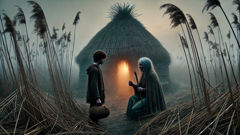
Padraig shared this with Seamus, who was too weak to stand but agreed to try. They roasted strips of salmon salted with tears and river brine, forcing Seamus to eat despite his agony. That night, they carried him to the riverbank. He lay on his back, lips parted, as Padraig and Niamh kept vigil. The moon hung low and cold. Hours dragged by. At last, Padraig glimpsed a shimmer—something small and slick sliding from his father’s mouth into the grass. It darted away toward the river. Niamh spat into the darkness: “May you never find another host.”
But relief was short-lived. Seamus slowly regained his strength, yet hunger still haunted the household. Food vanished at odd times; Maire complained of constant thirst and cramps. Then, Padraig himself began to feel hollow after every meal. He woke from nightmares of something crawling inside him. He realized, with growing dread, that the Alp-luachra could move from person to person if they shared food or drink. It was no solitary curse, but an infestation.
Desperate, Padraig sought answers beyond his grandmother’s wisdom. He trekked into the heart of the bog, following tales of a tinker who knew the ways of fairy-folk. The land grew wilder: moss hung in thick curtains, and the air was heavy with peat and secrets. He found the tinker, an old woman named Aoife, living in a hut woven from reeds and brambles. She listened as Padraig poured out his tale.
“There are bargains in every curse,” Aoife said, her eyes bright as foxfire. “The Alp-luachra feeds on hunger and fear as much as food. You must confront it, not just trick it.” She gave him three gifts: a pouch of salt from the sea, a carved hazel staff, and a riddle: ‘The thing that drinks is sated only by thirst; to end its hunger, feed it what it cannot swallow.’
Padraig returned home, mind racing. He salted every meal, but that only brought brief respite. He watched his family for signs—craving, exhaustion, strange moods. The Alp-luachra, he realized, was cunning. It shifted hosts, waiting for weakness or greed. Only by understanding its nature could he hope to break its hold.
III. The Bargain of Salt and Shadow
That autumn brought storms that battered the village and filled the river with mud and debris. The O’Sheas’ struggle became the talk of Drumcliff. Some whispered that the family was cursed, while others left offerings—fresh milk, sprigs of rowan—at their door. Padraig ignored the gossip and focused on unraveling Aoife’s riddle.
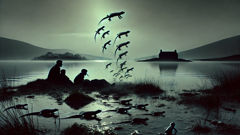
The Alp-luachra’s hunger was insatiable, but it had one weakness: thirst. Yet salt alone only drove it out for a while. To truly rid themselves of it, they had to make the creature choose to leave, to face something it couldn’t endure.
He tried experiment after experiment. He set traps—bowls of salted milk beside the hearth, hoping to lure the fairy-newt out. He and Maire took turns sleeping by the river after meals, but the Alp-luachra always found its way back inside one of them. At last, exhausted and nearly hopeless, Padraig sat by the fire with Niamh, who told him of another legend: some fairy-beings could be bargained with, tricked into revealing their true form if shown something they desired but could never claim.
That night, as rain drummed on the thatch, Padraig dreamed of a dark water where hundreds of tiny eyes gleamed. The Alp-luachra spoke to him in a voice like a trickle of slime: ‘Feed me what I cannot swallow, and I will leave you be.’ Padraig woke with a start and realized the riddle’s meaning—he must give the creature water so vast and wild that it could never drink its fill.
With Niamh’s help, Padraig devised a plan. They would take the entire family to Lough Conn, the great lake nearby, at sunrise. There, each would eat a salted meal and lie on the shore with mouths open, inviting the Alp-luachra to emerge. The hope was that the presence of the vast lake would lure the creature out, as no stream or bowl could match its expanse.
Dawn broke cold and pale as they set out, Seamus leaning on Padraig’s shoulder and Maire clutching Niamh’s hand. At the edge of Lough Conn, they laid out a feast of salted fish and bread, eating together in silence. One by one, they reclined by the water’s edge, mouths open to the rising sun.
Minutes passed. Padraig’s heart thundered. Suddenly, he felt a wriggling in his throat—a slick, cold presence fighting to escape. He gagged, coughed, and at last felt something slide free from his mouth into the wet grass. All around him, Maire and Seamus coughed and sputtered as well. Tiny newts—each glistening and strange—dropped from their lips and wriggled toward the lake. As they reached the water, they seemed to melt into shadow, vanishing beneath the waves.
The family lay gasping in the dawn light. They felt empty—truly empty—for the first time in weeks. But hunger now was honest and wholesome, not the gnawing ache of something alien inside.
Conclusion
The O’Sheas returned home changed. Their ordeal left them with a wariness for wild waters and a deep respect for the unseen forces that thread through Ireland’s land and lore. Padraig became known not only as a fisherman but as a boy who outwitted a fairy curse—a tale his children and grandchildren would retell whenever the wind sighed over the bogs at dusk. Niamh’s warnings passed into village custom: never drink from a stream unless you hold your breath; never lie on your belly near water; always share your salt with neighbors, for you never know when you might need their help against things that slip unseen through the cracks of the world.
The legend of the Alp-luachra persisted—sometimes as a warning for the foolish or greedy, sometimes as a reminder that even the smallest creatures can carry a curse. The wild places of Ireland are never truly tamed; their shadows hold old magic, and their waters run deep with memory. To this day, in County Mayo and beyond, parents whisper to children: beware what you swallow in the dark, for hunger isn’t always your own. The Alp-luachra remains a part of Ireland’s story—a thread woven through mist and myth, teaching each generation to walk carefully between worlds.

